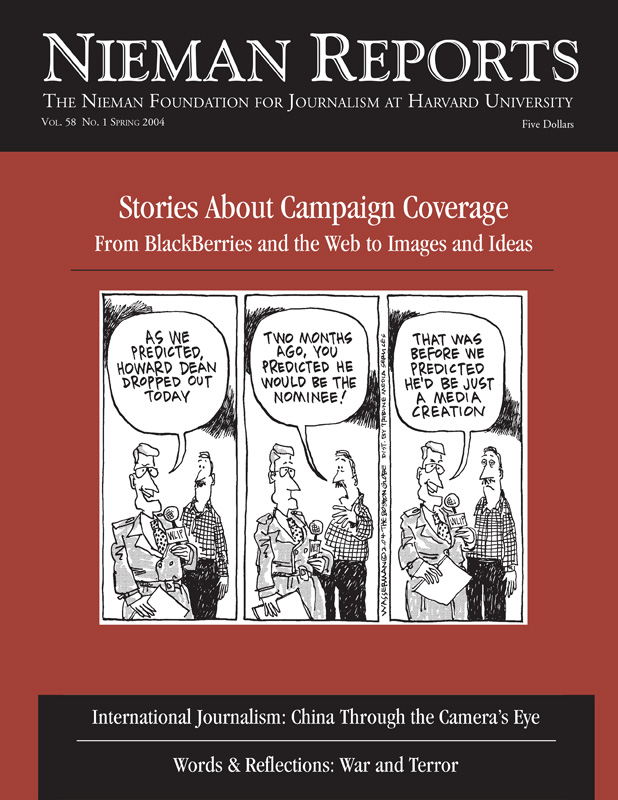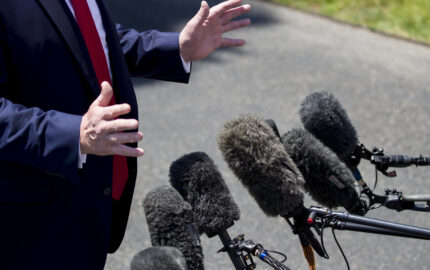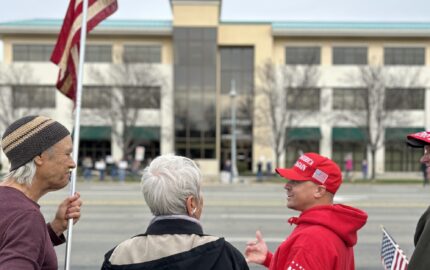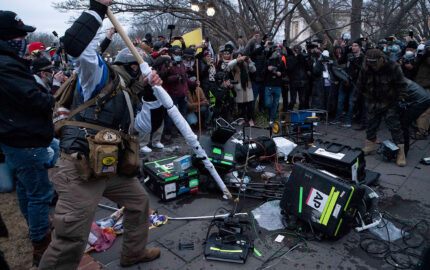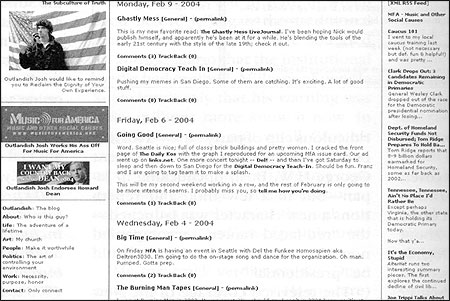
OutlandishJosh.com is the Web site of the Dean supporter whom Wayne Woodlief interviewed online.
Just when I thought I might be a troglodyte, fully convinced that reportorial shoe leather and old-fashioned eyeball-to-eyeball interviews were still the truest way to report on a political campaign, I got the opportunity to conduct my first online, InstantMessage interview. Aha! Now I had the chance to reassess my long-held belief and explore this new reporting tool called the Internet.
The setting was intriguing enough in the boiler room of Democratic presidential hopeful Howard Dean’s New Hampshire primary headquarters in Manchester on a freezing day in early January. No need to just interview outside in the cold when a computer hook-up could transport me anywhere I wanted to go to interview Dean supporters. Everywhere around me people were typing at computer screens displaying a colorful array of pages. As the date of the first primary neared, dozens of workers were scouring voter lists and setting up targeted appeals to Dean supporters on the scores of “unofficial” Web sites backing his campaign: Doctors for Dean, Deadheads for Dean, Dykes for Dean, Geeks for Dean. On and on and on. Even the graffiti in the men’s room wasn’t graffiti at all, but spoofs from Internet columns—Salon’s Where’s my Dean Meetup man?—and cartoons of chatroom techies from the Doonesbury strips about the most Internet-driven candidate of all—“People-Powered Howard.”
Being curious to learn more about how and why these so-called “Deanie Babies” got hooked on their champion, I asked for help in setting up an online interview. And that’s how I talked to “Outlandish Josh” from San Francisco with whom I exchanged messages for 30 minutes. After a short time online with him, Josh, whose full name is Josh Koenig, didn’t seem so outlandish after all. He is 24 years old, a graduate of New York University with a bachelor of fine arts degree in theater, and he’s active in the music promotion business.
And it was the role the Internet played in getting him hooked on Dean that impressed me. Josh typed for me the story of how he heard of Dean in the fall of 2002. Turns out that he found out about Dean when he began protesting the looming war in Iraq. “I’d never been a protester before but I couldn’t stand just watching, and people mentioned that Dean had opposed the war,” Josh told me. But it wasn’t until Josh saw Dean speak—watching him online on C-SPAN.org three weeks after he’d delivered a rousing, antiwar speech at the California Democratic Convention—that Josh turned into an ardent spreader of the Dean gospel on the Internet.
As Josh was sending his messages to me, I felt his excitement because of how intensely his words were written, even though his voice was silent. “I was immediately excited because he [Dean] was saying everything I had been saying, down to using some of the same words and phrases, but I’d never heard anyone in a position of any authority saying them before,” Josh typed to me, in reply to one of my questions.
This exchange left me with a sense of the Internet’s power as a tool for both campaigning and for covering campaigns. Josh helped me understand what it could be like to become enthralled by a candidate while you are at home watching him on your computer. And it gave me an inkling, for the first time, of what a fine tool the Internet can be for journalists in capturing some of the color of a campaign.
I’m not fully converted to online interviewing, nor do I expect ever to be, but working on it in New Hampshire was fast, and its accuracy is guaranteed with a verbatim printout in my hand about a minute after we said goodbye. What an online interview isn’t, however, is as spontaneous and warm as face-to-face encounters. I have little doubt that spotting voter trends works much better by getting away from a computer and talking with people in diners or malls or at their doorsteps. Long ago The Washington Post’s David Broder started to knock on doors and really talk with voters, and I usually know I’m on the right track when I bump into Ron Brownstein of the Los Angeles Times interviewing voters in the Mall of New Hampshire in Bedford.
In the hours I spent at the coffee bar at Harvey’s Bakery in Dover, New Hampshire, on the same day Josh and I talked online, enough customers told me about their increasing admiration for Wesley Clark, a four-star general who is preaching peace, that I didn’t need the political polls published two days later to convince me that he was passing Senator John Kerry in New Hampshire.
Just when I was about to close my notebook, Darrell Howard, a businesswoman visiting from Arizona, told me she is a registered Republican, “but I’d vote for Hillary Clinton. She’s smart and tough, and she’d get things done.” Maurice Richard of Dover, New Hampshire, who had been lauding Clark, perked up when he heard Howard say this. “I’d vote for her, too. Anybody who’d put up with Bill this long deserves a chance to run the country.” He seemed to not be entirely speaking in jest. Waitress Bobbi Best chimed in, “She [Hillary] has the strength and the ability.”
It was like a sudden verbal brush-fire, the kind of spontaneous eruption I can’t imagine online interviews producing. So I’ll take these online exchanges, with their speed and the retrieval capacity of the Net, and use them as wonderful adjuncts to our craft. But don’t count me among those who are going to put aside the basic tools of our trade—a ballpoint pen, a good notebook, and a willing ear.
Wayne Woodlief, a 1966 Nieman Fellow, has been a reporter and chief political columnist with the Boston Herald for 27 years. In 2004 he will pursue independent writing opportunities and write a weekly Herald op-ed column.
